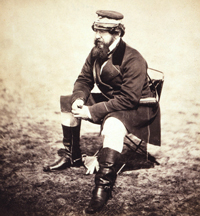 William Howard Russell was born in Tallaght at Lily Vale, Jobstown on 28th March 1820.
William Howard Russell was born in Tallaght at Lily Vale, Jobstown on 28th March 1820.
William studied at Trinity College, Dublin and got his first break in journalism in 1841 when he was asked to cover the Irish elections for the Times of London newspaper.
He became a regular reporter for the Times, covering Irish life, including Daniel O’Connell’s campaigns for the repeal of the Act of Union, and visiting the West of Ireland during the Famine.
In 1854, William was sent to the Crimea to report on the War between Russia and an alliance of Britain, France, Ottoman Turks and Sardinia. This was the first war to be covered extensively in the media and his reports revealed the sufferings of the British Army during the winter of 1854, where they were hindered by a lack of supplies and medical assistance, leading to thousands of deaths from disease. He witnessed many of the major battles of the war, including the Charge of the Light Brigade at Balaclava.
William Howard Russell’s reports gave rise to severe public criticism of the Government of the day (which fell the following year) and the military commanders. The Times’ reporting also contributed to the appointment of Florence Nightingale to lead a team of nurses to the Crimea to care for wounded soldiers.
Subsequently, the well-travelled Mr. Russell reported on the Indian Mutiny (1858), the American Civil War (1861-62), The Austro-Prussian War (1866), the Franco-Prussian War (1870-71) and the Zulu War (1879). He also published numerous books on his experiences.
William never lost interest in Irish affairs and, looking back on his career, he wrote that in all his years “supping full of horrors in the tide of war, I never beheld sights so shocking as those which met my eyes in that Famine tour of mine in the West (of Ireland)”.
William Howard Russell died in London on 10th February 1907 and is buried in Brompton cemetery.